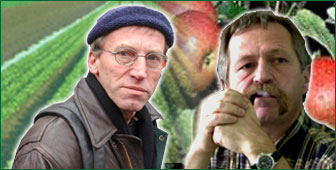Farm activists on trial

The trial of 46 farming activists accused of disturbing the peace after blockading distribution centers of supermarket giants Coop and Migros has entered its second day.
The accused are members of the farmers association, Uniterre, which accuses the supermarkets of ruining beef, lamb and pork farmers by undercutting prices.
Fernand Cuche, the Uniterre general secretary and a member of the House of Representatives, has defended last November’s blockade as legitimate.
The activists face fines worth up to SFr3,000 ($1,853). They also may be hit with potential claims from Coop and Migros for damages caused by the blockade, estimated at more than SFr1.6 million.
Uniterre has close links with other activist farmers’ groups around Europe, and the case is being seen as a test for farmer’s rights. The trial is being conducted in the French-speaking town of La Chaux-de-Fonds.
The activists are not alone in saying that they cannot make ends meet in the face of continually falling prices for agricultural products. Swiss farmers have long been lobbying the government for more money, and in some cases for protection from cheaper imports.
Bleak future
Their argument, that they face bankruptcy without more help, is borne out by the statistics. A recently published report on the state of Switzerland’s agricultural sector for 2001 found that around 30 per cent of Swiss farms were not making enough money to survive.
In response, the Federal Office for Agriculture has encouraged farmers to seek alternative ways of generating income, such as tourism, in the hope that unprofitable farmers will gradually move off the land.
In a recent interview with swissinfo, the director of the agriculture office, Manfred Bötsch ruled out more money for Switzerland’s already generously subsidised farmers.
“Switzerland already spends more on farming than on education,” he said. “It would be hard to justify any more taxpayers’ money to support them.”
Moving off the land
In reality, the number of farmers in Switzerland has been falling for decades. At the start of the 20th century there were around 200,000 farmers; today, that number has declined to 60,000.
For its part, the Swiss Farmers Union denies its aim is to keep loss-making farms alive. Its position is that today’s farmers should be given time to adapt to changing circumstances.
Spokeswoman, Heidi Bravo, told swissinfo recently: “The point is to take things slowly. Some farmers will give up and do something else, others will get involved in tourism. Some may join together to share resources, while others still will go into the organic market.”
The Federal Agriculture Office agrees. Manfred Bötsch says the government’s efforts to encourage farmers to seek other ways of making a living is a long-term approach. “The challenge is to make sure, in the short term, that the social damage to farming communities is not too great.”
For farmers across Switzerland, the message seems to be adapt or die – eventually. For those on trial at La Chaux-de-Fonds, the best they can hope for would seem to be acquittal.
swissinfo

In compliance with the JTI standards
More: SWI swissinfo.ch certified by the Journalism Trust Initiative
You can find an overview of ongoing debates with our journalists here . Please join us!
If you want to start a conversation about a topic raised in this article or want to report factual errors, email us at english@swissinfo.ch.